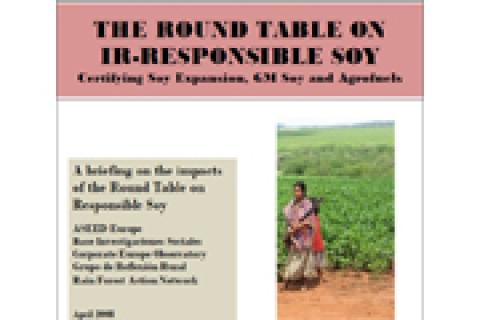Buxa was one of those forests which the British foresters boasted of. Originally grassland and Sal forests in stony highlands, the area was irreversibly altered when the colonial foresters moved in around 1865 and banished the indigenous swidden agriculturists like the Rava, the Mech, the Dukpa and the Garo. Evergreen trees colonised the empty spaces rapidly as the forest fires got "controlled", and the foresters came to realize that they could not have new Sal plantations unless the fire motif was re-introduced.
Other information
In 1989, WRM and Sahabat Alam Malaysia (Friends of the Earth) produced the publication “The Battle for Sarawak’s Forests”, which documented not only the destruction of forests and forest peoples’ livelihoods in Sarawak, but also the local resistance process, which included major road blockades established as from 1987 by local communities for stopping the entry of logging trucks into their territories.
In late May, aerial photos taken during a fly-over piloted by the coordinator of the Ethno-Environmental Front of FUNAI (the National Indigenous Foundation of Brazil) confirmed the existence of indigenous people living in voluntary isolation on the border between the Brazilian state of Acre and Peru. They are members of one of four indigenous ethnic groups living in isolation in this area.
The expansion of large-scale plantations --either crops or trees-- for the production of liquid agrofuels such as bioethanol and biodiesel is increasing in many Southern countries –with harmful impacts on people and the environment.
Now, even the FAO admits the risks. A recently published FAO report looks into agrofuel production and their gendered impacts, explaining that it may increase the marginalization of women in rural areas, threatening their livelihoods.
On the first days of this month the Tasmanian people got to know of a deal that had been struck four months before between their government and the timber company Gunns. The deal, called the Sovereign Risk Agreement, provides that taxpayers should fund the company along 20 years with $15 million in case its wood supply is compromised by any reason. (1)
Biofuels – bio-diesel oil extracted from plants to replace high cost fossil fuels – have become controversial as the biofuel plantations are taking away lands mainly used, in particular for food production, by local communities.
In Burma, the ruling military junta has embarked on a massive expansion of biofuel plantations through forced confiscation of lands as well as arrests, fines, and beatings of farmers.
In November 2007, several representatives from World Rainforest Movement visited Komatiland Forests' operations at Brooklands in Mpumalanga province in South Africa.
By the WRM
The CBD recognized in 1992 the “vital role of women in the conservation and sustainable use of biological diversity” and affirmed “the need for the full participation of women at all levels of policy-making and implementation for biological diversity conservation” (Preamble; paragraph 13).
In spite of that, women have remained as invisible as ever within the deliberations of the CBD’s conferences of the parties.
Certifying Soy Expansion, GM Soy and Agrofuels
ASEED Europe, Base Investigaciones Sociales, Corporate Europe Observatory, Grupo de Reflexión Rural, Rain Forest Action Network - April 2008
The Constituent Assembly formed to discuss and draft a new Ecuadorian Constitution resolved on 14 March 2008 to grant an amnesty to 357 human rights activists who had been “criminalized for their protest and resistance actions in defence of their communities and the environment,” according to an official press release. Most of the 357 are community and peasant leaders, some of them indigenous, from communities throughout the country.
Ghana: Norwegian biofuel company destroyed local forest to establish a large jatropha (1) plantation
Agriculture in Northern Ghana accounts for more than 90% of household incomes and employs more that 70% of the population in the region. Most of the agricultural production is by small-holders at subsistence level, reliant on seasonal rainfall which is unpredictable and sporadic. During the dry season much of the population is idle, forcing people to migrate to the more prosperous southern parts of the country where they are employed in menial jobs.
A recent study published by WWF (1) analyzes deforestation and forest degradation in Riau Province between 1982 and 2007 and identifies their main drivers: pulpwood and oil palm industrial plantations.
The study shows that the fastest rate of deforestation in Indonesia is occurring in central Sumatra's Riau province, which used to have 78% of its land covered by forest. In the past 25 years, some 4.2m hectares (65%) of its tropical forests and peat swamps have been cleared for industrial plantations.


